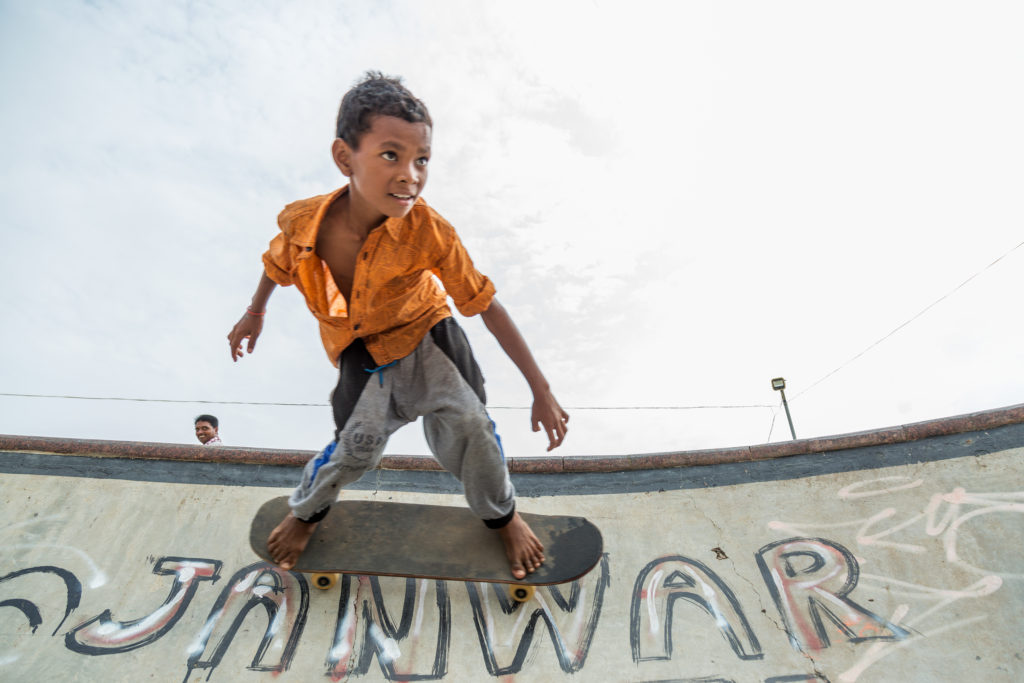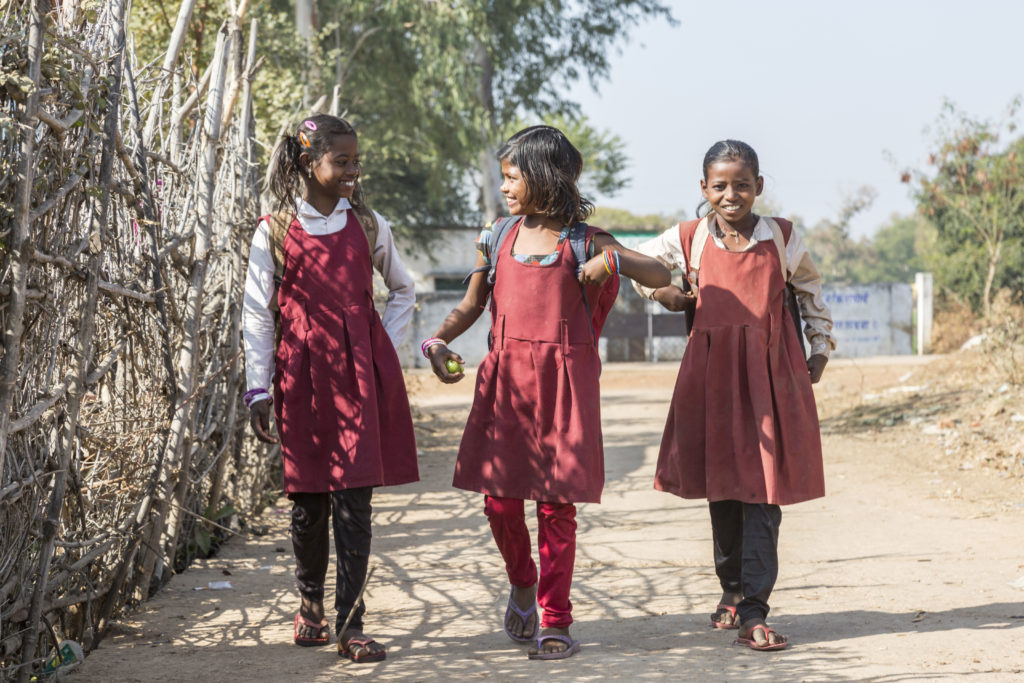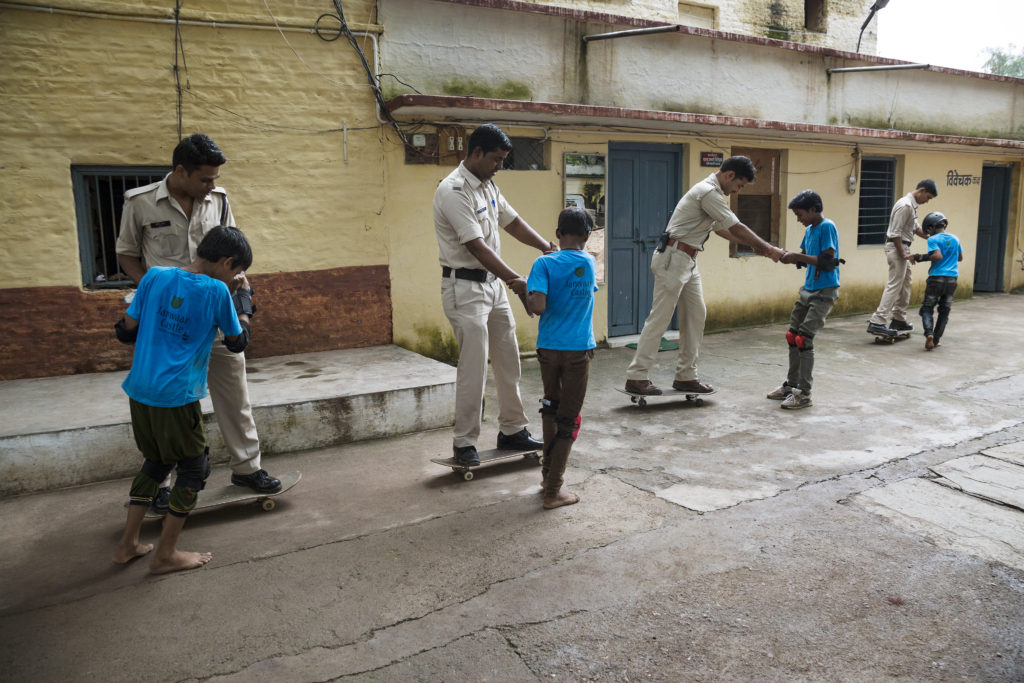Guest Stories – Skateboarding as a metaphor for social and cultural change in rural India

Like the title of her book “REMOTE. The Rural Changemakers of Janwaar”, Ulrike Reinhard came across as remote during her two-day stay at Savista! With her windblown hair, faraway look in her eyes and strong determined stride she seemed totally self contained, content to be by herself with her own thoughts… serene, accommodating, undemanding… A wayfarer on a long journey.
It was Christmas time. And Savista had a musical concert in the making. And resident guests most of whom seemed absorbed in their own preoccupations.
A chance conversation with Ulrike when we met to exchange goodbyes minutes before her departure, turned out to be fortuitous and enriching. The story she recounted of her association with rural India, that had to do with a skatepark – of all things -, was both unusual and eye-opening.
One is familiar with the sight of kids skateboarding in the streets, sidewalks and parks in U.S. cities. But it seemed hard to imagine it happening in an Indian village. And, for the activity to be designed to act as an engine of social and cultural change!
She told us that she had been a resident of a remote village in the interior of the central Indian state of Madhya Pradesh for the last two years. She was no stranger to Rajasthan either, having attended several editions of the annual Jaipur Literature Festival. In the Madhya Pradesh village of Janwaar, she had created a skatepark for children where they could have fun and discover mobility and dexterity…
A place where girls could learn the tricks of soaring on the skateboard side by side with – and matching shoulders with – boys…
A place whose sole entry rule – with the children themselves acting as the gatekeepers – was: “No school, No Skateboarding”.
The open-ended experiment – that she calls a “sandbox” – had gone on to set off many unanticipated eddies of social change in Janwaar.
She was now looking to apply the same model, bolstered by the lessons learnt, in a village in Dausa district neighbouring Savista. One of the innovations on the new site would be to construct the skatepark using traditional methods of construction including the use of natural materials. This could possibly bring down the costs considerably, as against the Janwaar Castle skatepark which had been concrete-built and therefore proved more expensive. Ulrike’s stopover at Savista for a few days of rest in the midst of her travels was a much-needed respite.
At our request to share the skatepark story with our readers, she graciously sent us this write-up – an interview with her, based on her book – describing her experience of living in rural Madhya Pradesh and working with children, to help them “shake up” their own lives and possibly imagine alternative futures for themselves and, hopefully, their community.
For more information on the social dynamics of setting up Janwaar Castle and its aftermath, and future Janwaars-in-the-making, visit Ulrike’s website on the subject:
http://www.rural-changemakers.com
You can write to Ulrike at ulrike@ulrikereinhard.com
____________________________

“REMOTE. The Rural Changemakers Of Janwaar”
It’s been three years since a skatepark came up in an obscure village in central India. Or, if one actually made the long yet picturesque trip to Janwaar in Madhya Pradesh, in the middle of nowhere.
The facility, called Janwaar Castle, conjured up a community of barefoot skateboarders, who have made an impression on the rest of the country and around the world with their enthusiasm and talent.
And each time they rolled out on a skateboard, this bunch took on the onus of bringing about change around them.
What was once a closed environment, resistant to any change that came its way, is today an open sandbox, ready for experimentation and moving in a direction that hopes to set an example for other rural communities such as these. The journey over these years has been charmingly captured by the founder, Ulrike Reinhard, in the book, ‘REMOTE. The Rural Changemakers of Janwaar’ , with stunning visuals of Janwaar, made mostly by ace photographer, Vicky Roy.
“It was important to document how people see what is happening in Janwaar. From the kids, to the villagers, people who have been volunteering with us as well as visitors, this book captures their experience,” Reinhard says.
“REMOTE, because that’s exactly where we are, in the middle of nowhere!” she laughs.
At the start of the book, Reinhard explains what brought her to India and what it took to set up the skatepark. That, essentially, was the easy part; the bigger challenge was to expose the villagers to change, and more
importantly, get them to embrace it.
“Look at the smaller villages in India, they are a part of a very rigid, traditional set up. Without movement, there will never be change, so you need to shake them up and get them moving. This is essentially what the
skatepark has done,” she says.
The model on which Janwaar Castle was set up was firstly, an open process, where anyone could plug-in and play, with no predefined program that focussed on a particular issue. Secondly, having previously worked in the
field, Reinhard used the power of networks.
“You see huge companies like Cisco which embrace these network models and allow their employees to decide where they want to see their company in the next few years. It’s the same with Janwaar – the villagers must drive it forward. When I saw someone in the village move, we would define a single individual learning pass for him. But it was designed in such a way that it gave back to the community. The vision was to uplift the lives of the villagers in Janwaar,” she explains.
The biggest challenge for Reinhard and her team was to not interfere too much, and instead, step back and observe the direction in which the change was progressing. It all started with the kids – all too eager to learn and
pull off the latest tricks on a skateboard. Over a period of time, some of them stepped up to show different abilities – from creative arts to vocational skills, which were honed by various experts across India.
A few even had the opportunity to step out of Janwaar for the first time and observe the world outside. While three boys rolled out on skateboards across Europe for over six weeks, Asha had the opportunity to spend a month in England. In the coming months, three girls will visit Australia to skate and stitch.
“I’m really happy to say that these kids who’ve been out have really taken up the responsibility of being role

models. They’ve become leaders in their own community, trying to give back to the village through their own
learning and experience. Besides being self-confident and open to interaction, they are also ready to deal with failure, which I think is great,” Reinhard says.
It hasn’t been all smooth sailing for Janwaar. The registered NGO, Janwaar Castle Community Organisation, went through a rough patch last year. But Reinhard believes it only brought the village together, as they found
common ground to unite and make their voices heard. Then, there is the issue of network connectivity, which restricts the scope of operation, especially when it comes to education and learning. For instance, Internet
access could bring in essential tools such as the ‘School in the Cloud’ founded by Sugata Mitra, or help tap into the volunteer network around the world, who are happy to work with the kids on various subjects every once
in a while.

The lack of infrastructure though hasn’t stopped Janwaar Castle from growing. One of the key initiatives that was taken up last year was the Data Project. A team of volunteers walked into the 130-odd households in
Janwaar and gathered socio-economic data – right from what they did for a living, the number of members in each household, their income and how they spent it and if they had Aadhar cards. They then looked up the various schemes offered by the state and central government and created a program to match the data.
“So on one hand, we have government schemes and then, the data of the village. We can now see who is eligible for which scheme. Our next step is to file these applications, which will have a direct and immediate impact
on the village. Take a widow for example who benefits from it – some money will make her life a little bit easier,” Reinhard says.
“It was also very intense learning for the volunteers involved. To understand how big the gap is between their smartphones and the data that its collecting is the first step towards closing this gap.”
Then, there are the six homestays that have been set up to accommodate visitors and give them a taste of rural life, as well as skateboarding. This in turn, has ensured cleanliness and hygiene, especially when it comes
to sanitation. For some of the villagers, it has also translated to more income than their regular jobs.
“In such a place, progress is when people start thinking about another future. They have started realising that village life has some clear advantages, after interacting with outsiders. This is helping them create
their own identities and they take pride in their village today. It is what you need to prevent migration. If we succeed a little more in creating opportunities, things will change for the better,” she says.

